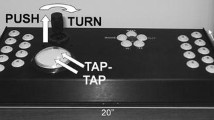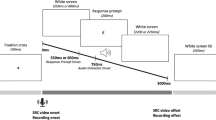Abstract
This study sought to determine whether some combination of imitation training and comprehension training was necessary to achieve verbal production or whether comprehension training alone was sufficient to result in verbal production. Fifty-one first- and second-grade subjects were trained to imitate eight words (Spanish nouns) for which there were no referents. An additional set of eight words was trained in a comprehension task where overt verbal rehearsal was prohibited. Once criterion of two successive sessions of 100% performance was reached in training for both imitation and comprehension, training modes were reversed so that items initially trained in imitation were then trained in comprehension andvice versa. Results showed that initial comprehension training did result in some verbal production, whereas initial imitation training, as expected, did not. A marked improvement in verbal production performance was observed when initial comprehension training was followed by imitation training. When initial imitation training was followed by comprehension training, verbal production also resulted but not to the degree or with the consistency of performance which marked the comprehension-then-imitation sequence. Furthermore, comprehension training required more trials to reach a similar level of proficiency when it followed imitation training than when it preceded imitation. These data indicate that initial imitation training interferes with acquisition of subsequent comprehension and production responses and that the preferred training sequence is one which initially focuses on comprehension and follows this with verbal imitation.
Similar content being viewed by others
References
Ashcraft, M., and Kellas, G. (1974). Organization in normal and retarded children: Temporal aspects of storage and retrieval.J. Exp. Child Psychol. 103: 502–508.
Asher, J. (1972). Children's first language as a model for second language learning.Mod. Lang. J. 56: 133–138.
Baer, D. M., Peterson, R. F., and Sherman, J. A. (1967). The development of imitation by reinforcing behavioral similarity to a model.J. Exp. Anal. Behav. 10: 405–416.
Baer, D. M., Guess, D., and Sherman, J. A. (1972). Adventures in simplistic grammar. In Schiefelbusch, R. L. (ed.),Language of the Mentally Retarded, University Park Press, Baltimore.
Bricker, W. A. (1972). A systematic approach to language training. In Schiefelbusch, R. L. (ed.),Language of the Mentally Retarded, University Park Press, Baltimore.
Fraser, C., Bellugi, U., and Brown, R. (1963). Control of grammar in imitation, comprehension, and production,J. Verb. Learn. Verb. Behav. 2: 121–135.
Hermann, P., Ruder, K., and Spradlin, J. (1974). Imitation and comprehension training and their effects on verbal production-A replication. Unpublished manuscript, Bureau of Child Research, University of Kansas.
Mann, R., and Baer, D. (1971). The effects of receptive language training on articulation.J. Appl. Behav. Anal. 4: 291–298.
Postovsky, V. A. (1970). Effects of delay in oral practice at the beginning of second language learning. Unpublished Ph.D. dissertation, University of California at Berkeley, pp. 27–29.
Ruder, K., and Smith, M. (1974). Issues in language training. In Schiefelbusch, R. L., and Lloyd, L. L. (eds.),Language Perspectives: Acquisition, Retardation, and Intervention, University Park Press, Baltimore, pp. 565–605.
Ruder, K., Smith, M., and Hermann, P. (1974a). Effects of verbal imitation and comprehension on verbal production of lexical items. In McReynolds, L. V. (ed.), Developing systematic procedures for training children's language.Am. Speech Hearing Assoc. Monogr. 18: 15–29.
Ruder, K., Stremel, K., and Lingwall, J. (1974b). Clinical application of comprehension-based language training procedures. Unpublished manuscript, Bureau of Child Research, University of Kansas.
Schumaker, J., and Sherman, J. A. (1970). Training generative verb usage by imitation and reinforcement procedures.J. Appl. Behav. Anal. 3: 273–287.
Sherman, J. A. (1965). Use of reinforcement and imitation to reinstate verbal behavior in mute psychotics.J. Abnorm. Psychol. 70: 155–164.
Sherman, J. A. (1971). Imitation and language development. In Reese, H. W., and Lipsett, L. P. (eds.),Advances in Child Development and Behavior, Academic Press, New York, pp. 239–272.
Whitehurst, G. J., and Vasta, R. (1975). Is language acquired through imitation.J. Psychol. Res. 4: 37–60.
Winitz, H., and Reeds, J. (1972). The OHR method of langauge training. Kansas City Working Papers in Speech Science and Linguistics, No. 3, University of Missouri in Kansas City, Kansas City, Mo.
Author information
Authors and Affiliations
Additional information
This study was supported by Grant HD 00870 from the National Institute of Child Health and Human Development and Grant NS 10468 from the National Institute of Neurological Diseases and Stroke awarded to the Bureau of Child Research, University of Kansas, Lawrence, Kansas.
Rights and permissions
About this article
Cite this article
Ruder, K.F., Hermann, P. & Schiefelbusch, R.L. Effects of verbal imitation and comprehension training on verbal production. J Psycholinguist Res 6, 59–72 (1977). https://doi.org/10.1007/BF01069575
Received:
Issue Date:
DOI: https://doi.org/10.1007/BF01069575




